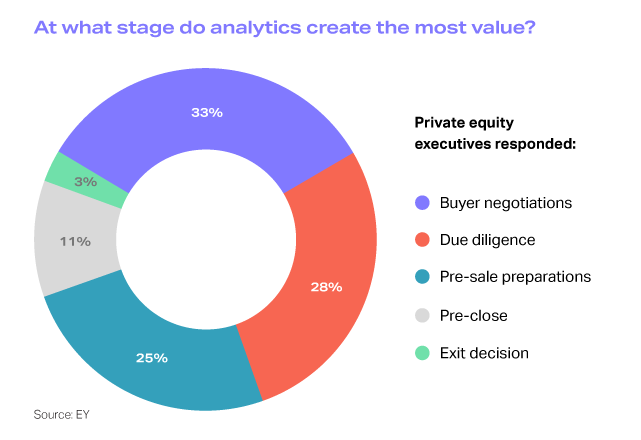
By: Allvue Team
August 10, 2022
Investment research has come a long way from poring over charts trying to identify long-term trends and prompt portfolio shifts. As markets have evolved – extending into the more-complex alternative investment sector – so has the need for increasingly sophisticated research. The various stages of managing data – collecting it, analyzing it, and acting on it effectively – are integral to success through the lengthy private equity lifecycle.
What is the role of data science in private equity?
With competition for private equity deals fiercer than ever, private equity analytics has gone beyond fundamental research to a more quantifiable, scientific approach. PE and venture capital firms are collating disparate data across industries, geographies, and development stages while managing increasingly elaborate reporting demands from their limited partners. New technology helps GPs corral this information: saving time, streamlining processes, and reducing the risk of error inherent in manual-based data management.
“PE firms increasingly look to data and analytics in both the pre-deal and due diligence phases to inform decision-making.”
— PwC US, “When experience is not enough: Using data and analytics throughout the PE investment cycle,” Sep. 23, 2021
Many firms resisted becoming early adopters. As recently as 2017, three-quarters of private equity managers were struggling to see how data science could help them manage their portfolio companies.
Just a year later, though, demand started growing, with 68% saying they used some form of analytical research in the due diligence process. And Gartner predicts that by 2025, more than 75% of early-stage investor research will be informed by artificial intelligence and data analytics.

DOWNLOAD: Tear Sheet Templates for Private Equity Managers
Use case: Private equity due diligence criteria
Whether a firm is focused on more mature private companies or early-stage start-ups in the venture capital space, the evaluating criteria should be similar. The factors below are a good starting point but may be supplemented with more bespoke metrics. Digesting and acting on this data, no matter how unwieldy it may seem initially, is easier when it’s compiled in a centralized, accessible location:
- Financial information: Comprehensive financial due diligence is critical for determining a fair valuation. These metrics can include (but aren’t limited to) income and cash flow statements, balance sheets, bank statements, leases, contracts and invoices, customer lifetime value, and an intellectual property audit.
- Digital footprint: A company’s social media can provide a wealth of information, especially for those in the B2C sector. Technology can help here, too, as social listening tools can flag traditionally “positive” or “negative” words to see how the brand is being received in the marketplace.
- Team background and management: A company’s leadership team can be analyzed beyond background checks, from years of relevant experience to previous startup track records and partner overlap in the industry. Evaluate a company’s system and network infrastructure, when possible, and make a note of any vendor relationships.
- Product offering: Fund managers may find value in gut-checking product and service pricing (including the product margins), evaluate any differentiators, and measure perceived value among target consumers. Part of the due diligence process should also be flagging any unprofitable products and identifying any that could become more profitable with additional resources.
Tracking these factors in a manual or siloed system limits the ability to follow an opportunity’s progress or see how these drivers are shifting and affecting each other. The rapidly advancing field of technology designed especially for private equity data analytics is designed to streamline this research in a customizable way that works with firms’ existing methodologies. Even when data is coming in from multiple sources, a platform that integrates it seamlessly into one reporting module can not only save time but also have a positive impact on investment decisions.
READ MORE: How to Simplify Venture Capital Data Collection with Allvue
Managing private equity analytics
Once a firm has gone through due diligence, data science can also help track KPIs, or key performance indicators, through the life cycle of a fund. Whether it’s 3 years or 10, advanced analytics tools allow managers to seamlessly monitor real-time financial and operational data for their port cos and assets.
What’s more, advanced technology lets firms monitor their overall portfolio holistically, empowering teams to flag trends and risks, identify opportunities, establish benchmarks, and determine the best exit strategies.
Adopting a new system can be daunting, but flexible solutions can help streamline data collection and analysis through every stage of the process, from capital raising and research management to portfolio monitoring and everything in between. Having a centralized source for all data empowers your team to make more timely decisions rooted in private equity data science.
Allvue’s highly customizable software solutions provide general partners with the investment intelligence needed to make superior investment decisions, from initial investment to exit. Reach out to learn more or schedule a demo to see how we can help all your teams, from fundraising to finance, put data to work.


